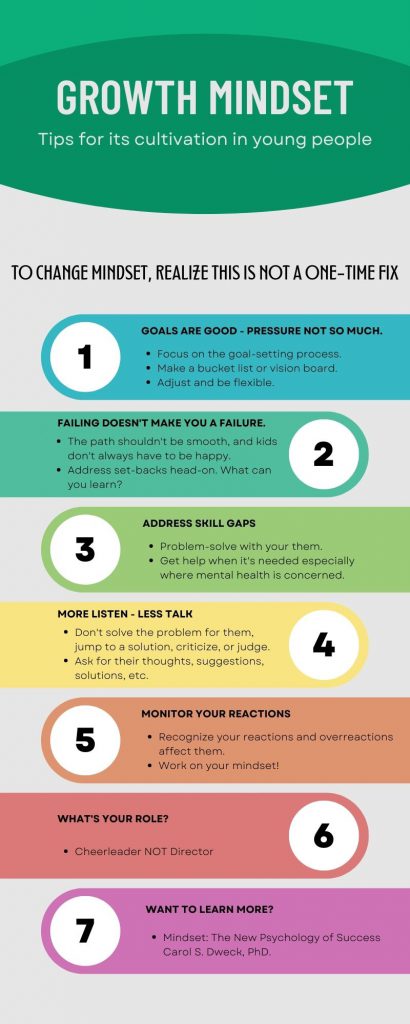 What is a Growth Mindset?
What is a Growth Mindset?
A vital skill we encourage in 4-H youth is to set goals and objectives to reach those goals. But what happens when they face a challenge that’s hard and scary or when they fail? With so much emphasis placed on achievement, success, and winning, is it possible for us to grow through challenges or failures? Absolutely! And 4-H provides opportunities to do just that. 4-H uses several theories, models, and frameworks to “do” positive youth development. One of the models we use is the 4-H Thriving Model (Arnold, 2018). This model describes what happens when 4-H programs provide the conditions for youth to explore their sparks in a safe environment and are supported by positive relationships with adults and other youth. One of the concepts related to the 4-H Thriving Model is the growth mindset. According to Carol Dweck (2006), our mindset can contribute to our success or our failure. You can think of the mindset as a spectrum. On one end is the fixed mindset and on the other end is the growth mindset.
First, let’s look at the opposite mindset – the fixed mindset and its tendencies:
- Avoids challenges
- Quits/gives up quickly or easily
- Negative self-image/self-talk
- Effort is pointless
- Avoids or ignores feedback or criticism
- Resentful of other’s successes
- Critical and judgmental of others
- Places blame elsewhere/makes excuses.
Conversely, the growth mindset and its tendencies might look like this:
- Embraces challenges
- Doesn’t give up easily/charges ahead
- Is realistic but compassionate to self
- Effort is part of the journey
- Learns from feedback and criticism
- Is inspired by and celebrates the successes of others
- Helpful and caring to others
- Looks for and believes in possibilities.
Why is a Growth Mindset Important?
Youth and adults who have a growth mindset are more motivated to learn, have better relationships, and are more resilient. As individuals, we all fall somewhere on the mindset spectrum. Sometimes we may have a fixed mindset in one area (such as public speaking) but have a growth mindset in another area (such as being a good writer). I’ve seen both mindsets played out many times in the livestock show arena, at shotgun matches, at the Chick Chain poultry show, and at the tailgate grilling contest. One of my senior 4-Hers came in second place in Chick Chain showmanship. Instead of being upset about not winning, his comment was,
“[4-Her] was really good. I learned a lot by watching him, so I know what to practice for next year.”
On the opposite side, I’ve overheard kids (and parents) exclaim something like ‘there’s no use in showing a pig because nobody can beat [4-Her].’ How could you encourage the growth mindset in that moment? By saying something like, “So what can you do differently? Besides winning, what else are you learning?”
As 4-H professionals and volunteers, we can support the development of a growth mindset to help youth thrive. Knowing where youth fall on the mindset spectrum can help you design and scaffold 4-H experiences to develop a growth mindset over time. For example, if we go back to the example of a youth who has a fixed mindset that they are bad at public speaking. As a caring adult, look for other ways that youth can develop confidence in communicating with others. Encourage them to start by using their spark (such as photography, art, or poetry) to communicate with others and share their project experiences. As they become more confident, encourage them to prepare exhibits, deliver team demonstrations, or even serve in a leadership position as an officer or committee chair.
Digging Deeper
Do you know where you are on the mindset spectrum? Before we can help youth thrive, we need to know whether we have a growth mindset or a fixed mindset. Take this assessment to determine where you fall on the mindset spectrum http://blog.mindsetworks.com/what-s-my-mindset.
To learn more about growth mindset, I highly recommend Mindset: The New Psychology of Success by Carol S. Dweck, PhD. I challenge you to implement these tips with your 4-Hers this year!
References:
Arnold, M. E. (2018). From context to outcomes: Adolescent thriving in 4-H Youth Development Programs. Journal of Human Science and Extension, 6(1), 141-160.
Dweck, C. S. (2006). Mindset: The new psychology of success. Random House.
- Chick Chain Teaches Science and Workforce Ready Skills - March 17, 2023
- Are your Chickens Ready for Frigid Temps? - December 21, 2022
- Cultivating a Growth Mindset - August 11, 2022
